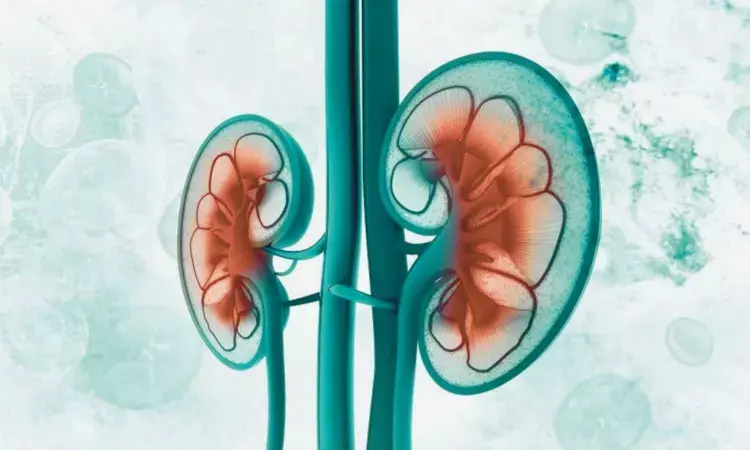- Home
- Medical news & Guidelines
- Anesthesiology
- Cardiology and CTVS
- Critical Care
- Dentistry
- Dermatology
- Diabetes and Endocrinology
- ENT
- Gastroenterology
- Medicine
- Nephrology
- Neurology
- Obstretics-Gynaecology
- Oncology
- Ophthalmology
- Orthopaedics
- Pediatrics-Neonatology
- Psychiatry
- Pulmonology
- Radiology
- Surgery
- Urology
- Laboratory Medicine
- Diet
- Nursing
- Paramedical
- Physiotherapy
- Health news
- Fact Check
- Bone Health Fact Check
- Brain Health Fact Check
- Cancer Related Fact Check
- Child Care Fact Check
- Dental and oral health fact check
- Diabetes and metabolic health fact check
- Diet and Nutrition Fact Check
- Eye and ENT Care Fact Check
- Fitness fact check
- Gut health fact check
- Heart health fact check
- Kidney health fact check
- Medical education fact check
- Men's health fact check
- Respiratory fact check
- Skin and hair care fact check
- Vaccine and Immunization fact check
- Women's health fact check
- AYUSH
- State News
- Andaman and Nicobar Islands
- Andhra Pradesh
- Arunachal Pradesh
- Assam
- Bihar
- Chandigarh
- Chattisgarh
- Dadra and Nagar Haveli
- Daman and Diu
- Delhi
- Goa
- Gujarat
- Haryana
- Himachal Pradesh
- Jammu & Kashmir
- Jharkhand
- Karnataka
- Kerala
- Ladakh
- Lakshadweep
- Madhya Pradesh
- Maharashtra
- Manipur
- Meghalaya
- Mizoram
- Nagaland
- Odisha
- Puducherry
- Punjab
- Rajasthan
- Sikkim
- Tamil Nadu
- Telangana
- Tripura
- Uttar Pradesh
- Uttrakhand
- West Bengal
- Medical Education
- Industry
Nephrosclerosis patients without diabetes and low levels of proteinuria may have rapid kidney function decline: Study

Japan: A groundbreaking post hoc analysis of the BRIGHTEN study has shed light on the intricate relationship between proteinuria and rapid kidney function decline in chronic kidney disease (CKD). The findings, published in Diabetes Research and Clinical Practice, challenge conventional wisdom by highlighting the nuanced impact of proteinuria based on the underlying cause of CKD.
The study found a greater risk than initially predicted of rapid kidney function decline in nephrosclerosis without diabetes (NS-DM) patients with low proteinuria levels.
There is no clarity on whether the effect of proteinuria on rapid kidney function decline is equivalent among non-DKD with diabetes (NDKD+DM), diabetic kidney disease (DKD), and nephrosclerosis without diabetes, particularly in patients with advanced chronic kidney disease (CKD). To clarify the same, Tomohito Gohda, Juntendo University Faculty of Medicine, Bunkyo-ku, Tokyo, Japan, and colleagues conducted a post hoc analysis using BRIGHTEN study data to compare the eGFR slope and the rapid kidney function decline prevalence, in addition to kidney and cardiovascular (CV) outcomes, in Japanese CKD patients among these three CKD categories.
The study included 1038 CKD patients who participated in the BRIGHTEN study. A linear mixed-effect model was applied to estimate each disease group's annual glomerular filtration rate (eGFR) decline.
The following were the key findings of the study:
- The prevalence of rapid decliners (rapid kidney function decline, defined as an eGFR loss of > 5 mL/min/1.73 m2/year) in the DKD group (44.6 %) was significantly higher compared with the NDKD+DM (27.9 %) and NS-DM (27.0 %) groups.
- The prevalence of rapid decliners in different urine total protein to creatinine ratio (UPCR) categories (<0.5, 0.5 to < 1.0, 1.0 to < 3.5, and ≥ 3.5 g/g) were equivalent between the DKD and NS-DM groups.
- The prevalence of a UPCR < 1.0 g/g in rapid decliners of the NS-DM group was more than double that in those of the DKD and NDKD+DM groups.
The findings showed that although NS-DM has a better kidney prognosis owing to its low proteinuria level, the kidney prognosis in NS-DM patients with a proteinuria level (0.5–1.0 g/g) may be worse than assumed.
"We propose a new concept that the effect (and weighting) of proteinuria on rapid kidney function decline may be different and greater in NS-DM patients with low proteinuria (0.5–1.0 g/g) levels compared with DKD or NDKD+DM patients with the same proteinuria level," the researchers wrote.
They suggested that even a relatively low proteinuria level of up to 0.5 g/g should be given more aggressive treatment in patients with NS-DM because they are more likely to experience a rapid eGFR decline versus patients with DKD or NDKD+DM.
Reference:
Gohda, T., Murakoshi, M., Suzuki, Y., Kagimura, T., Wada, T., & Narita, I. (2024). Effect of proteinuria on the rapid kidney function decline in chronic kidney disease depends on the underlying disease: A post hoc analysis of the BRIGHTEN study. Diabetes Research and Clinical Practice, 212, 111682. https://doi.org/10.1016/j.diabres.2024.111682
Dr Kamal Kant Kohli-MBBS, DTCD- a chest specialist with more than 30 years of practice and a flair for writing clinical articles, Dr Kamal Kant Kohli joined Medical Dialogues as a Chief Editor of Medical News. Besides writing articles, as an editor, he proofreads and verifies all the medical content published on Medical Dialogues including those coming from journals, studies,medical conferences,guidelines etc. Email: drkohli@medicaldialogues.in. Contact no. 011-43720751


